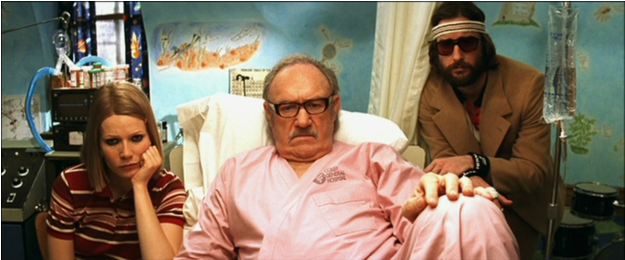Dani Klemes, web editor-in-chief
As with any Wes Anderson film, “The Royal Tenenbaums” (2001) follows a relatively constant framework: a quasi-dysfunctional group of individuals is thrust into an exaggerated conflict, and it’s all set in some oversaturated version of a postmodern city.
 We have the individuals: siblings Chas (Ben Stiller), Margot (Gwyneth Paltrow) and Richie (Luke Wilson), all of whom are in a post-success slump after their golden years in youth. The conflict: their neglectful father Royal (Gene Hackman) who, after claiming to be diagnosed with stomach cancer, makes it his goal to reconcile with his children. And the city: lustrous Sugar Hill in Manhattan, N.Y., just bordering the Hamilton Heights (think Gatsby-esque Upper East Side).
We have the individuals: siblings Chas (Ben Stiller), Margot (Gwyneth Paltrow) and Richie (Luke Wilson), all of whom are in a post-success slump after their golden years in youth. The conflict: their neglectful father Royal (Gene Hackman) who, after claiming to be diagnosed with stomach cancer, makes it his goal to reconcile with his children. And the city: lustrous Sugar Hill in Manhattan, N.Y., just bordering the Hamilton Heights (think Gatsby-esque Upper East Side).
From each Tenenbaum comes a different, almost equally noteworthy story. Chas, once a financial whiz, has two sons and lives in a state of pseudo-mourning after the death of his wife in a plane crash. Margot, an acclaimed playwright during her teen years, is a closet chainsmoker and is unhappily married to neurologist Raleigh St. Clair (Bill Murray). Richie, both a tennis prodigy and artist during his youth, is desperately in love with Margot (technically, she is adopted).
Often times, when directors try to mesh together too many eclectic personalities, the result is overwhelming and, for lack of a better word, sloppy. What more would you expect from a movie about tennis and neurology and borderline incest? But Anderson pulls it off, and he does one hell of a job of developing every aspect of each character. His narrative-style plotline could almost be considered a more refined version of “The Brady Bunch.”
Compared to his other works (or at least to the ones I have seen), “The Royal Tenenbaums” is by far, the most enjoyable, mainly because it makes the most sense (though I have to admit, “The Darjeeling Limited” came pretty close). Unlike “Moonrise Kingdom,” which was full of choppy, empty plot, “The Royal Tenenbaums” tells a story and sticks to it. There’s no white space (pun intended–Anderson loves his colors) or blurred lines or obscure metaphors.
The movie embodies all that is expected and adored in a Wes Anderson film: the kitschy aerial shots, the widescreen panning. It’s really a shame that the film is so short-lived (a mere 110 minutes). For such a brief story, though, the film packs in an almost innumerable amount of symbols and ideas and poetic undertones. Rather than professing a mocking tone toward the dysfunctionalities of the Tenenbaums, the film embraces their quirkiness, it applauds them. Because extraordinary people have ordinary problems too.
I happily give “The Royal Tenenbaums” an 8 out of 10 stars.





































